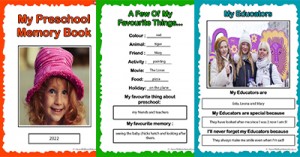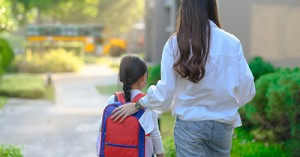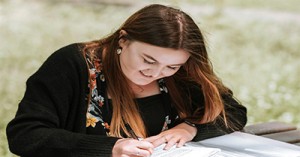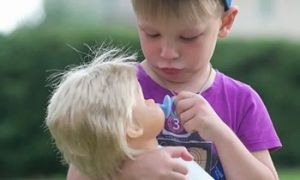This reflection guide is designed to support educators in rethinking school readiness through a holistic, child-centered lens. It encourages dialogue, challenges assumptions, and strengthens programming that honours each child’s unique journey.
Child-Centered Readiness
- How do we ensure that our definition of school readiness respects the individuality of each child?
- Are we considering the whole child—social, emotional, physical, and cognitive development—when assessing readiness?
- How do we identify and address gaps in readiness for children who may need additional support?
- What role does play-based learning have in fostering readiness, and how do we communicate its value to families and schools?
Educator Practice & Pedagogy
- How do we adapt our teaching strategies to meet the diverse needs of children preparing for school?
- Are we providing opportunities for children to practice self-regulation, problem-solving, and collaboration?
- How do we ensure that our readiness practices are culturally responsive and inclusive?
- What professional learning opportunities do we engage in to improve our transition-to-school practices?
Transition & Collaboration
- How do we build strong partnerships with families to support children’s transition to school?
- Are we effectively collaborating with schools to create a seamless transition experience for children?
- How do we prepare children for the structural and social differences they will encounter in school settings?
- What role do transition statements play in supporting continuity of learning, and how can we improve their use?
Equity & Inclusion
- How do we ensure that our readiness practices do not disadvantage children from marginalized or underrepresented groups?
- Are we actively challenging stereotypes and biases in our readiness assessments and practices?
- How do we advocate for systemic changes to address inequities that impact school readiness?
Policy & Compliance
- How do our school readiness practices align with the EYLF, NQS, and transition-to-school statements?
- Are we critically engaging with policy documents or simply complying with them?
- What data do we collect on school readiness, and how is it used to inform practice—not just reporting?
Critical reflection invites us to pause and examine the beliefs, practices, and systems that underpin our programming. Are we fostering readiness through play, relationships, and responsive pedagogy—or are we unintentionally replicating school-based expectations too early? Are our programs inclusive, trauma-informed, and culturally responsive? Do they empower children and families or reinforce inequities?
School readiness is often framed as a child’s ability to transition successfully into formal schooling. In early childhood, it is a dynamic, relational process shaped by children’s experiences, identities, and the environments we create. As educators, we play a pivotal role in preparing children not just for school but for life—with curiosity, confidence, and connection.
Further Reading
How To Approach School Readiness Planning For Preschoolers
School Readiness Program
School Readiness Checklist Aligned To EYLF Outcomes
School Readiness In Early Childhood
How To Prepare Preschoolers For School
How Play-Based Learning Supports School Readiness
Supporting Children's Transition To School
Play School's Ready, Set, Big School







 Here is the list of the EYLF Learning Outcomes that you can use as a guide or reference for your documentation and planning. The EYLF
Here is the list of the EYLF Learning Outcomes that you can use as a guide or reference for your documentation and planning. The EYLF The EYLF is a guide which consists of Principles, Practices and 5 main Learning Outcomes along with each of their sub outcomes, based on identity,
The EYLF is a guide which consists of Principles, Practices and 5 main Learning Outcomes along with each of their sub outcomes, based on identity, This is a guide on How to Write a Learning Story. It provides information on What Is A Learning Story, Writing A Learning Story, Sample
This is a guide on How to Write a Learning Story. It provides information on What Is A Learning Story, Writing A Learning Story, Sample One of the most important types of documentation methods that educators needs to be familiar with are “observations”. Observations are crucial for all early childhood
One of the most important types of documentation methods that educators needs to be familiar with are “observations”. Observations are crucial for all early childhood To support children achieve learning outcomes from the EYLF Framework, the following list gives educators examples of how to promote children's learning in each individual
To support children achieve learning outcomes from the EYLF Framework, the following list gives educators examples of how to promote children's learning in each individual Reflective practice is learning from everyday situations and issues and concerns that arise which form part of our daily routine while working in an early
Reflective practice is learning from everyday situations and issues and concerns that arise which form part of our daily routine while working in an early Within Australia, Programming and Planning is reflected and supported by the Early Years Learning Framework. Educators within early childhood settings, use the EYLF to guide
Within Australia, Programming and Planning is reflected and supported by the Early Years Learning Framework. Educators within early childhood settings, use the EYLF to guide When observing children, it's important that we use a range of different observation methods from running records, learning stories to photographs and work samples. Using
When observing children, it's important that we use a range of different observation methods from running records, learning stories to photographs and work samples. Using This is a guide for educators on what to observe under each sub learning outcome from the EYLF Framework, when a child is engaged in
This is a guide for educators on what to observe under each sub learning outcome from the EYLF Framework, when a child is engaged in The Early Years Learning Framework describes the curriculum as “all the interactions, experiences, activities, routines and events, planned and unplanned, that occur in an environment
The Early Years Learning Framework describes the curriculum as “all the interactions, experiences, activities, routines and events, planned and unplanned, that occur in an environment


